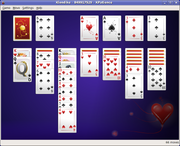| This page uses Creative Commons Licensed content from Wikipedia (view authors). | 
|

Klondike is the best-known form of solitaire to the point of being a synecdoche. It is a staple of computer operating systems, here shown as KPatience on the KDE desktop environment.
Solitaire, also called patience, often refers to single-player card games involving a layout of cards with a goal of sorting them in some manner. However it is possible to play the same games competitively (often a head to head race) and cooperatively. The term solitaire is also used for single-player games of concentration and skill using a set layout of tiles, pegs or stones rather than cards. These games include Peg solitaire and Shanghai solitaire.
These games typically involve dealing cards from a shuffled deck into a prescribed arrangement on a tabletop, from which the player attempts to reorder the deck by suit and rank through a series of moves transferring cards from one place to another under prescribed restrictions. Some games allow for the reshuffling of the deck(s), and/or the placement of cards into new or "empty" locations.
Solitaire has its own terminology; see solitaire terminology.
There are many different solitaire games, but the term "solitaire" is often used to refer specifically to the most well-known form, called "Klondike". Klondike and some other solitaire games have been adapted into two-player competitive games. See List of solitaire card games for more.
There is a vast array of variations on the solitaire/patience theme, using either one or more decks of cards, with rules of varying complexity and skill levels. Many of these have been converted to electronic form and are available as computer games. Basic forms of Klondike solitaire and FreeCell come with every current installation of Microsoft Windows. Many software solitaire collections can be downloaded from the internet at no charge.
History[]
Like the origin of playing cards, the origin of patience is uncertain. The game is most likely German or Scandinavian in origin. It became popular in France in the early 19th Century reaching England and America in the latter half. Patience was first mentioned in literature shortly after cartomantic layouts were developed circa 1765. The earliest known recording of a game of patience occurred in 1783 in the German game anthology Das neue Königliche L'Hombre-Spiel. Before this, there was no literary mentions in large game compendiums such as Charles Cotton's The Compleat Gamester (1674) and Abbé Bellecour's Academie des Jeux (1674).
There is an old tradition in the German or Scandinavian countries to use "patience" as a guide to what the near future has to offer, a kind of "luck" meter. This belief assumes that a person’s "luck" will vary from time to time and important matters should not be initiated or conducted when the cards are not favorable. If there are no winnings in the game for a number of tries it spells caution in what you do. If a win at the first try times are good and “luck” smiles at you, thus the immediate future can be used for important decisions. Timing the game is a further indicator of the strength of the outcome.
Napoleon was said to have "played patience" during his exile, however from written accounts he played Vingt-Un, Piquet, and Whist but not Patience. The story is thought to have arisen from a misinterpretation. Many solitaire games were named after him, such as Napoleon at St. Helena, Napoleon's Square, etc.
The first collection of solitaire card games in the English language is attributed to Lady Adelaide Cadogan through her Illustrated Games of Patience, published in about 1870 and reprinted several times. Other collections quickly followed such as Patience by E. D. Cheney, Amusements for Invalids by Annie B. Henshaw (1870), and later Dick's Games of Patience, published by Dick and Fitzgerald. Other books about solitaire written towards the end of the 19th century were by H. E. Jones (a.k.a. Cavendish), Angelo Lewis (a.k.a. Professor Hoffman), Basil Dalton, Ernest Bergholt, and Mary Whitmore Jones.
Solitaire Implementations[]
- Pretty Good Solitaire - a popular comprehensive Solitaire suite for Microsoft Windows
- PySol - an open source, cross-platform suite of Solitaire games.
- Solitaire Implementations Category
- Solitaire (Windows)
- Spider Solitaire (Windows)
- Boardwalk Solitaire (Windows)
- Solitaired - a popular online version of solitaire with leaderboards and over 100 variations of solitaire games
See also[]
- Mahjong solitaire
- Patience sorting
- Video poker
- Peg solitaire
- Soltrio Solitaire
References[]
Template:Refbegin
- Lee, Sloane & Packard, Gabriel. 100 Best Solitaire Games: 100 Ways to Entertain Yourself with a Deck of Cards. ; New York, N. Y.: Cardoza Publishing, 2004. (ISBN 1-58042-115-6)
- Arnold, Peter. Card Games for One. London: Hamlyn, 2002 (ISBN 0-600-60727-5)
- Moorehead, Albert H. & Mott-Smith, Geoffrey. The Complete Book of Solitaire and Patience Games. New York: Bantam Books, 1977 (ISBN 0-553-26240-8)
- Crépeau, Pierre. The Complete Book of Solitaire (a translation of Le Grand Livre des Patiences). Willowdale, Ontario: Firefly Books, 2001. (ISBN 1-55209-597-5)
- Marks, Arnold & Harrod, Jacqueline. Card Games Made Easy. Surrey, England: Clarion, 1997 (ISBN 1-899606-17-3)
Template:Refend
External links[]
- Template:Dmoz
- Lady Cadogan's Illustrated Games of Solitaire or Patience, by Adelaide Cadogan, 1914, from Project Gutenberg
- Games of patience for one or more players, second series, by Mary Whitmore Jones, about 1898, original book-scan from Archive.org
- Video demonstration a game of solitaire being played and associated commentary.
- The Mathematics of Solitaire - a video presentation about the Math behind solitaire
- dkmgames.com Nine free online solitaire games
- Klondike Battle - A solitaire based card game (Russian Bank) for iPhone/Mac/Windows/Linux
- Online Solitaire Play an ad-free Fandom-themed solitaire game
- Awesome Solitaire - Play online for free, a mobile friendly game of Solitaire